Belgian MPs Call Tehran-Brussels Prisoner Swap Treaty ‘Deal With Devil’
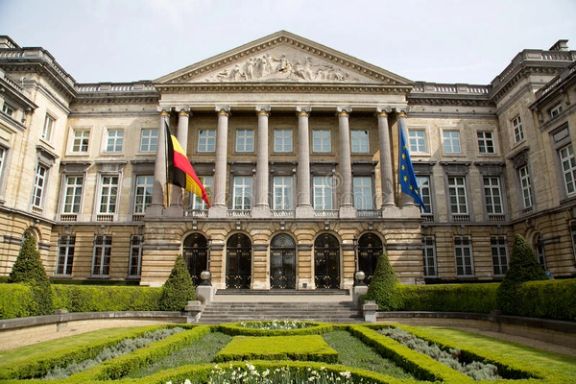
Belgium's parliament session to decide on a prisoner swap treaty between Tehran and Brussels, slated for July 14, was postponed until Tuesday, July 19.

Belgium's parliament session to decide on a prisoner swap treaty between Tehran and Brussels, slated for July 14, was postponed until Tuesday, July 19.
However, a group of MPs used the Thursday open session attended by the prime minister to criticize him over the pact, calling it "a deal with the devil."
New Flemish Alliance leader Peter De Roover was not dissatisfied with the postponement, saying, “Maybe there will finally be some realization that this is a devil’s pact.”
Georges Dallemagne from the Les Engagés party and Ellen Samyn from Flemish nationalist, right-wing party Vlaams Belang also expressed their dissatisfaction with the treaty once again. “Belgium’s international credibility is not much, but if this is ratified, it will sink under the ground,” said Samyn.
Prime Minister Alexander De Croo, who is also responsible for foreign affairs during Sophie Wilmès’s absence, reiterated that Belgium wants to do everything it can “not to let Belgians who are innocent abroad in prison” stay in jail.
Wilmes, who finalized her resignation as foreign minister on Thursday, quitted to take care of her husband, former Australian footballer Chris Stone, who has been diagnosed with brain cancer. Wilmes had already temporarily stepped down in April, when De Croo took over her foreign affairs duties.
Critics say that the agreement will result in sending back Assadollah Assadi, an Iranian diplomat serving a 20-year prison sentence in Belgium for planning a terror attack in Paris four years ago.
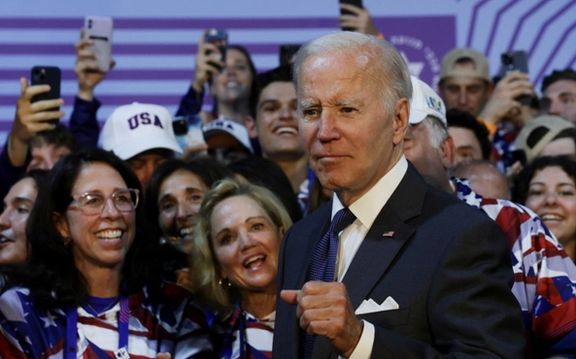
Iranian media reacted to US President Joe Biden's regional tour as one website said, "the main objective of the visit is to create an anti-Iranian coalition."
A former Foreign Ministry director general Ghasem Mohebali told Nameh News that the coalition which is likely to be formed in the Middle East against Iran during Biden's visit can lead to an increase in Iran's military expenditure and is likely to have negative economic, security and probably military implications for Iran.
According to Nameh News, although some of Iran's hardliner media have claimed that the visit has already proven to be futile, others are still worried about its implications, particularly in re-aligning relations between Israel and Saudi Arabia. What is certain is that the situation is highly sensitive, and Tehran's reaction can be important.
Mohebali said that the fact Biden's article in the Washington Post before his visit, and the fact that the latest round of indirect talks between Iran and the United States in Doha failed, provide a good opportunity for the opponents of the Iran nuclear deal, including Israel and Saudi Arabia to impose more costs on Iran by masterminding new developments in the region.
He added that Iran failed to use the divide between the United States on the one hand and Israel and Saudi Arabia on the other during the Biden administration’s first months in office. Now the situation has changed as the Washington needs Saudi Arabia's oil, Mohebali said. He also argued that Iran can benefit from Washington's need for energy too, but Tehran should reach an agreement first. Otherwise, US sanctions will remain in place and the population will continue to suffer.
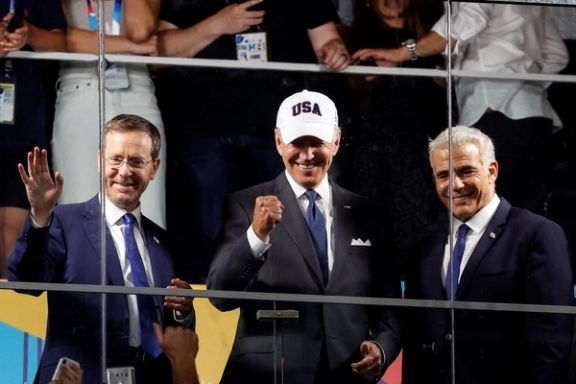
International affairs analyst Adnan Tabatabai told the moderate conservative website Khabar Online on July 14, that Biden's regional tour can provide Iran with a strategic opportunity.
Tabatabai said, the main objectives of Biden's visit are discussing Saudi Arabia's oil production and export policies as well as the security of the Middle East and particularly the Persian Gulf region.
The visit marks the United States' renewed interest in the Middle East where oil can play a key part for the West's security. Meanwhile, the visit is likely to pave the way for the creation of what was previously called the Arab NATO or an alliance between Western and Arab states. Meanwhile, Iran perceives a threat resulting from the strengthening of diplomatic and political ties between Israel and Saudi Arabia.
Tabatabai said that following Biden's characterization of Iran as a security threat, Iran is likely to escalate its negative approach to Biden's visit. On the other hand, Saudi Arabia and the United Arab Emirates are still annoyed by the hesitant US reaction to the 2019 missile and drone attack on Aramco facilities.
The lingering hard feelings in Riadh and Abu Dhabi, said Tabatabai, might provide a strategic opportunity for Iran to continue its talks with Saudi Arabia and the UAE.
Meanwhile, proreform daily Arman Melli wrote in its Thursday edition that Iran's nuclear program and reports about Tehran sending "hundreds of drones" to Russia to help Moscow in its war against Ukraine are likely to be on the agenda of Biden's talks during his regional tour. The daily said Putin's probable visit To Iran next week could be Moscow's answer to Biden's regional tour. The daily quoted analyst Ali Asghar Zargar as saying that "Moscow believes Iran is its winning card in its confrontation with the West."
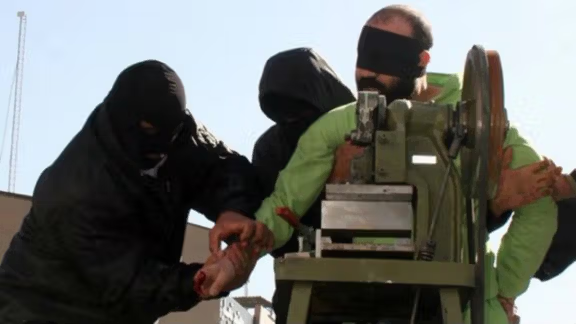
A senior Iranian prosecutor says several cases of amputations for robbery are currently at the execution stage, and called on judges not to hesitate to issue death and amputation sentences.
The chief prosecutor of Iran’s Khorasan Razavi province, Mohammad-Hossein Doroudi, said on Thursday that the verdicts for cutting off fingers and hands of several convicts are going through the legal formalities to be carried out.
"The judiciary does not show mercy to those who break the norms of the society and disrupt the public order,” he added, noting that judges issue sentences for hand amputation and even execution in theft cases based on the constitution and the sharia law (Islamic law) regardless of foreign calls against such sentences.
Late in June, the head of the Iranian association of surgeons, Iraj Fazel, called on the judiciary not to sanction the amputation of fingers to punish thieves.
In a letter to the chief justice Gholam-Hossein Mohseni-Ejei, Fazel called the practice "worrying and horrifying" and said it would create “a wave of hatred and disgust in the world” against the Islamic Republic.
Earlier in June, four fingers of a prisoner were cut off in Tehran’s Evin prison with a guillotine reportedly installed at the infirmary a month earlier to carry out such sentences.
According to Islamic Sharia law, punishment for theft can be amputation of fingers or hands.
Eight men convicted of theft are at imminent risk of having their fingers cut off, according to the Abdorrahman Boroumand Center for Human Rights in Iran (ABC) and Amnesty International.
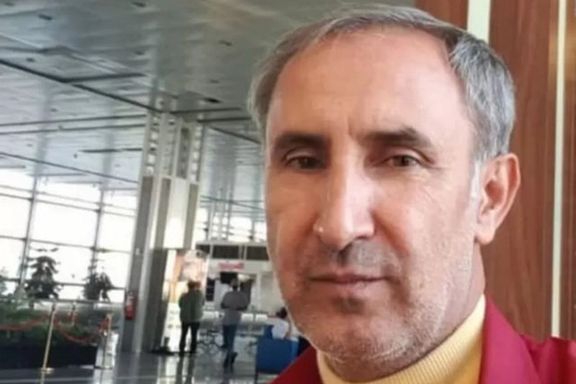
Iran’s has “strongly condemned” a Swedish court’s sentencing of a former Iranian jailor to life imprisonment over executions of political prisoners in 1988.
Following the announcement of Nouri’s sentencing Thursday, foreign ministry's new spokesperson Naser Kanani in a statement “strongly condemned” the Swedish court’s “politically-motivated and unacceptable” verdict against Nouri, saying the Stockholm government would be responsible for the damage the verdict would cause in bilateral relations.
Kanani accused Sweden of giving into pressure by an Albania-based opposition group, Mujahedin-e Khalq Organization (MEK), that Tehran considers a terrorist organization. Most of the approximately 5,000 prisoners summarily executed in prisons were members of MEK serving their sentences.
On the eve of the court ruling, Iran repeated calls for Nouri’s release, saying his detention is driven by “false allegations” made by the MEK.
Iran’s Foreign Minister, Hossein Amir Abdollahian, met with Majid Nouri, Hamid Nouri’s son, on Wednesday. In the meeting he said he had held a telephone call with Swedish Foreign Minister Anne Linde and called for Nouri’s immediate release.
Kanani accused the Swedish court that Nouri’s “most basic human rights” have been denied during his 30 months incarceration. “The treatment of Nouri and the limitations imposed on him is clear proof a violation of human rights by those who claim [to defend] human rights,” the statement said.
The accusations coming from one of the world’s most criticized human rights abusers would hardly find any attentive ears.
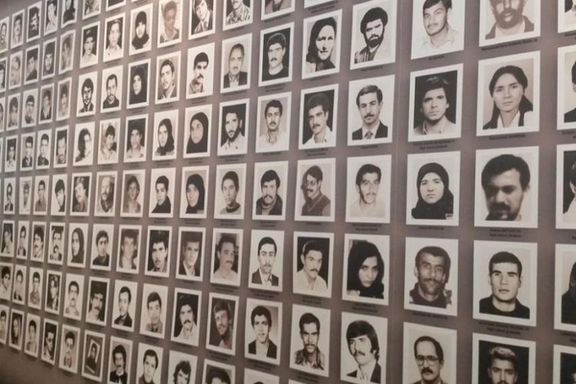
Iranian activists, opponents of the Islamic Republic and human rights defenders showed their immense satisfaction on social media over the verdict, expressing hope that the main leaders who approved and organized the killings would one day face independent courts.
Nouri, now 61, was charged with “war crimes, crimes against humanity, torture, and participating in the continued crime of refusing to return the bodies of executed prisoners to their families.” He has denied any wrongdoing and said plaintiffs' allegations were a "completely imaginary story".
In April Swedish prosecutors who invoked the principle of "universal jurisdiction" for serious crimes to bring the case to trial submitted their final indictment life imprisonment for Nouri.
Nouri, a former deputy prosecutor at Gohardasht Prison near Tehran at the time of the killings, is the first person ever put on trial for the executions carried out based on a fatwa by Iran's then-supreme leader, Ruhollah Khomeini, against the MEK which carried out a wave of bombings in Iran and struck an alliance with Saddam Hussein during the 1980-88 war. “Showing mercy to those who take up arms against the Islamic government is being naïve,” Khomeini said in his fatwa.
Most of victims were linked to the MEK but there were also some with links to leftist and secular groups such as Fadaiyan Khalq Organization (FKO) and Tudeh Party as well as some Kurdish groups such as Komala and Kurdish Democratic Party of Iran.
The exact number of prisoners executed during the purging of prisoners in 1988 is not known but according to Amnesty International, the Iranian authorities "forcibly disappeared" and "extrajudicially executed" around 5,000 between July and September 1988.
There are allegations that Iran seeks to exchange Nouri with Swedish-Iranian scientist and academic Ahmad-Reza Djalali arrested on vague charges of espionage and collaboration with Israel in 2016 and sentenced to death in 2017.
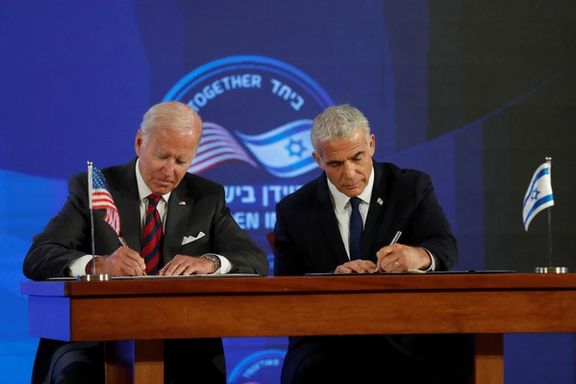
Wednesday’s US-Israel Joint Declaration gave a shared commitment to Israel’s military supremacy and prevent Iran from building nuclear weapons.
The declaration, with the text signed by Israeli Minister Yair Lapid and United States President Joe Biden released Thursday, expressed “unshakeable US commitment” to Israel’s “military edge.” Washington pledged further “defense assistance” on top of the $38 billion 10-year Memorandum of Understanding in 2016 under President Barack Obama and the $1-billion assistance after the 2021 Israeli-Palestinian violence centered on Gaza.
The document – dubbed the ‘Jerusalem Declaration’ – singled out as integral “to this pledge…the commitment never to allow Iran to acquire a nuclear weapon.” The US was, it said, “prepared to use all elements of its national power to ensure that outcome.”
While US officials have previously spoken vaguely of means to preclude an Iranian weapon, this is apparently the first time such a commitment has been made openly with Israel, which is widely believed to have carried out attacks on Iranian nuclear sites, which are monitored by the International Atomic Energy Agency (IAEA), and killed its scientists.
Lapid reportedly told Biden that the time had come to end diplomatic efforts to revive the 2015 Iran nuclear deal, from which Trump withdrew the US and which Biden had an election commitment to revive.Lapid argued instead for a “credible military threat.”
Aside from the nuclear issue, Biden committed the US “together with other partners to confront Iran’s aggression and destabilizing activities, whether advanced directly or through proxies and terrorist organizations such as Hezbollah, Hamas, and Palestinian Islamic Jihad.”
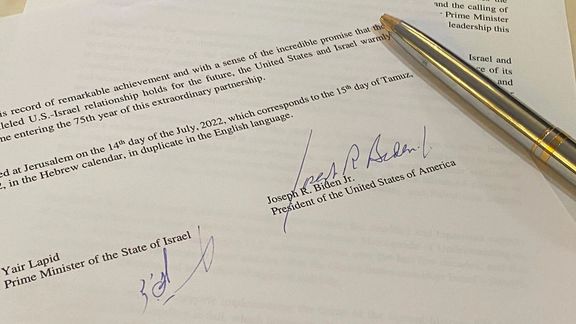
‘Robust regional architecture’
While the declaration noted Biden’s “longstanding and consistent support of a two-state solution” allowing a Palestinian state in Israeli-occupied territories, it pledged to work against “all efforts to boycott or de-legitimize Israel” and “to firmly reject the BDS campaign.” Calls for boycotting and disinvestment from Israeli entities active in the occupied West Bank have gathered momentum since rights groups including Amnesty International concluded that Israeli military rule amounted to a form of apartheid where Jewish settlers had political and civil rights denied to Muslims and Christians.
The Biden-Lapid declaration anticipated Biden’s arrival in Saudi Arabia Friday as part of a process of “building a robust regional architecture.” It hailed Israel’s 2020 ‘normalization’ agreements with Bahrain, Morocco, and the United Arab Emirates as important “to the cause of regional security, prosperity and peace” and hailed March’s Negev summit in Israel – attended by the foreign ministers of of Bahrain, Egypt, Israel, Morocco and the United States – as “efforts to build a new regional framework that is changing the face of the Middle East.”
Officials and hardliner media in Tehran have already condemned the emergence of an Israeli Arab alliance, telling the United States that no regional arrangement “can save the Zionist regime”.
Nour News, close to Iran’s supreme national security council on Thursday threatened that Tehran can use “new methods” for “punishing” Israel, and energy shipments could be endangered in the region. This was a little-veiled threat to shipping in the Persian Gulf and possibly in the Red Sea, where Iran’s Houthi allies have attacked vessels in the past.
Iranian government media simply carried the news of the US-Israeli declaration, as a first reaction Thursday afternoon, but further official and semi-official reaction will follow in coming days.
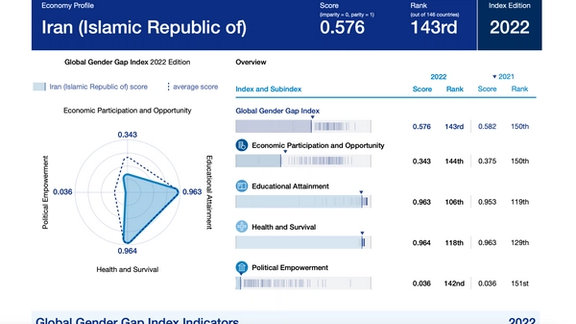
The World Economic Forum has published its latest report on the Global Gender Gap Index, placing Iran at the rock bottom only after Afghanistan, Pakistan, and Congo.
The 2022 report, which was released 13 July, benchmarks the current state and evolution of gender parity across four major dimensions of Economic Participation and Opportunity, Educational Attainment, Health and Survival, and Political Empowerment as well as in several other categories. Now in its 16th year, the report analyzed the evolution of gender-based gaps in 146 countries, providing a basis for robust cross-country analysis.
On average Iran finished 143rd in the list but in economic participation, Iran sits at the 144th place; in political empowerment, the Islamic Republic is the 142nd country; in health and survival, Iran ranks 118th; and in educational attainment on the 106th spot.
Iranian women held a nationwide civil disobedience protest on Tuesday (July 12) against the Islamic Republic’s forced dress code, while the government has recently increased harassment of women for their insufficient hijab and many have been detained by special police patrols. This has led to more tension amid economic hardship for 90 percent of the population on fixed income, while inflation has reached 55 percent and food prices have risen by more than 80 percent, according to May-June official reports. (https://www.iranintl.com/en/202207120933)
In another report published by the Economist intelligence unit -- the research and analysis division of The Economist -- on June 23, Tehran stands at the 163rd place of the list of 173 cities in Global Liveability Index, which quantifies challenges to an individual's lifestyle in cities worldwide.